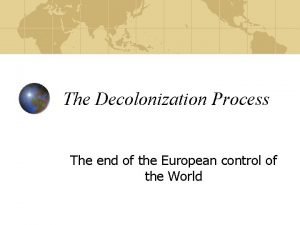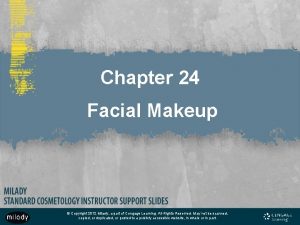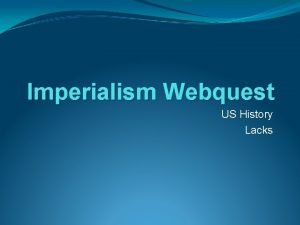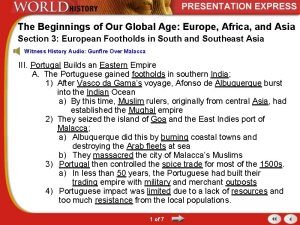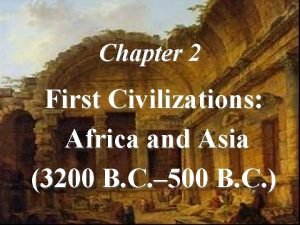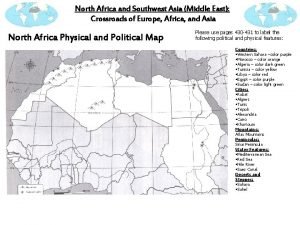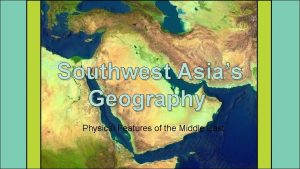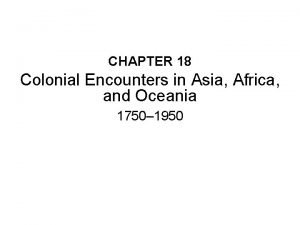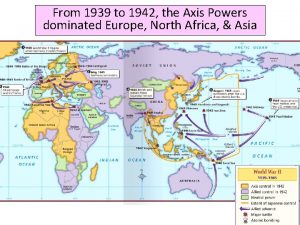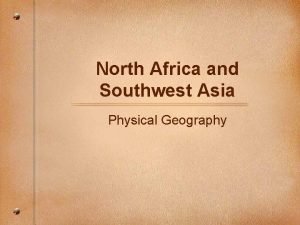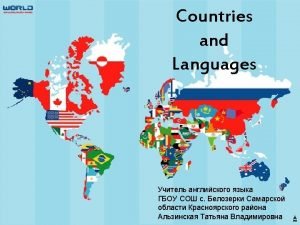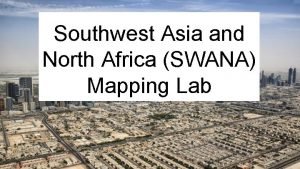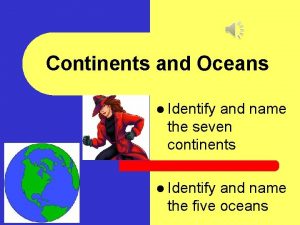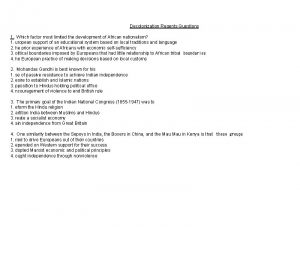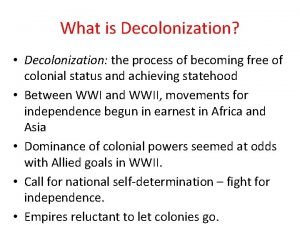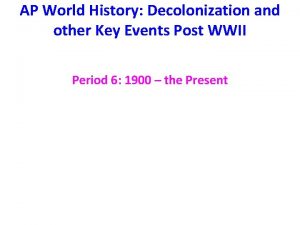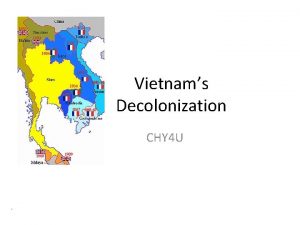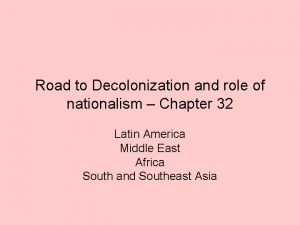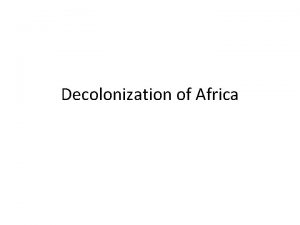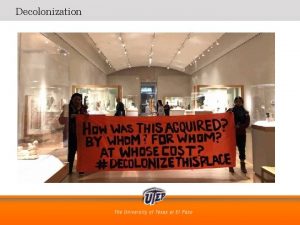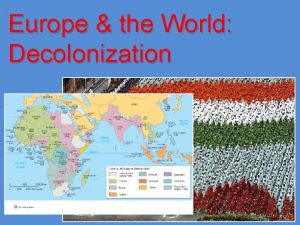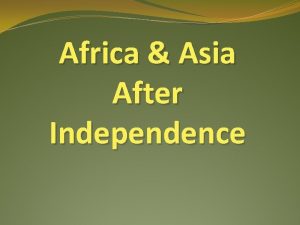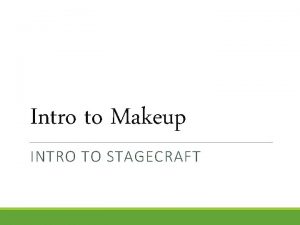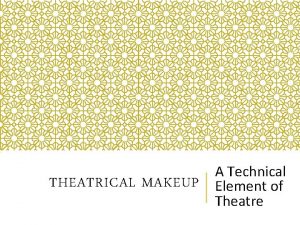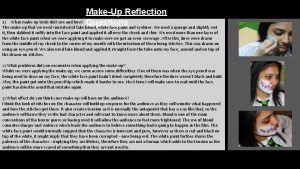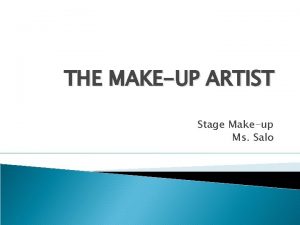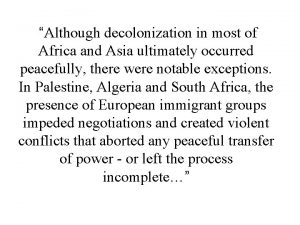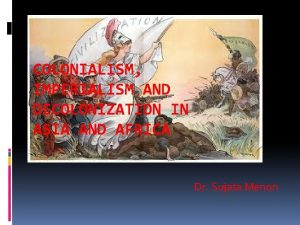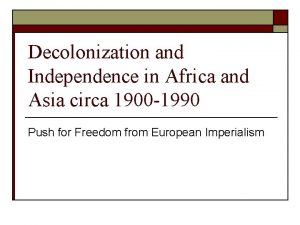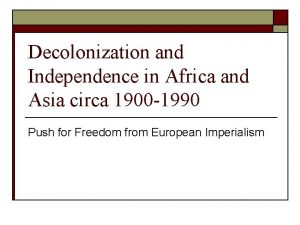Decolonization Decolonization of Asia Africa Changed the Makeup


















![European Economic Integration 1. 1947 General Agreement on Tariffs and Trade [GATT] § 23 European Economic Integration 1. 1947 General Agreement on Tariffs and Trade [GATT] § 23](https://slidetodoc.com/presentation_image_h2/493dc245f6bcd2ee06cbd42ac32d67bf/image-19.jpg)
![European Economic Integration 2. 1952 European Coal & Steel Community [ECSC]. § HQ in European Economic Integration 2. 1952 European Coal & Steel Community [ECSC]. § HQ in](https://slidetodoc.com/presentation_image_h2/493dc245f6bcd2ee06cbd42ac32d67bf/image-20.jpg)
![European Economic Integration 3. 1957 European Economic Community [EEC] “Common Market” § HQ Brussels. European Economic Integration 3. 1957 European Economic Community [EEC] “Common Market” § HQ Brussels.](https://slidetodoc.com/presentation_image_h2/493dc245f6bcd2ee06cbd42ac32d67bf/image-21.jpg)
![European Economic Integration 3. 1957 European Economic Community [EEC] § France, W. Germany, Italy, European Economic Integration 3. 1957 European Economic Community [EEC] § France, W. Germany, Italy,](https://slidetodoc.com/presentation_image_h2/493dc245f6bcd2ee06cbd42ac32d67bf/image-22.jpg)

![European Economic Integration 5. 1991 -92 Maastricht Agreements § European Union [EU] created from European Economic Integration 5. 1991 -92 Maastricht Agreements § European Union [EU] created from](https://slidetodoc.com/presentation_image_h2/493dc245f6bcd2ee06cbd42ac32d67bf/image-24.jpg)
- Slides: 24

Decolonization

Decolonization of Asia & Africa Changed the Makeup of the UN

Africa Produced Many Newly. Independent Nations in a Very Short Time

British Colonies Were Some of the First to Seek Independence because Britain felt hypocritical about colonialism. War left her weak and unable to afford colonies. A New African educated middle class began to emerge in the cities. The British and French try to keep special relations with former colonies without direct control.

Indian National Congress § 1885 The Indian National Congress was founded in Bombay. § swaraj “independence. ” * the goal of the movement. §Later led by Gandhi

Partition!

China since 1945 • From 1945 to 1949 China was involved in a civil war. National People’s Party, led by Chiang Kai-shek and the radical Mao Zedong. • In , these two split and Mao triumphed, establishing the People’s Republic of China Mao Tse-tung (Zedong)

China Becomes Communist • Zedong’s Communist People’s Liberation Army takes control. They marched 5, 000 miles to Northern China to set up a base. Mao’s army was supported by the Soviets. • Mao won the support of the rural workers, thus winning the war and unifying China as a Communist state. This reinforced U. S. fears of communist expansion in Asia

Tiananmen Square, Beijing

Mao’s Plans For China The Great Leap Forward – Created communes (selfsufficient settlements containing farms and industries) – They did not work at all: production fell, life was difficult, China experienced bad weather, rewards were limited – The plan was abandoned after two years Cultural Revolution • The revolution was to destroy the four olds: old ideology, old thoughts, old habits and old customs • Those who opposed Mao were publicly punished • Farm production fell, factory work stopped and schools closed • As a result there was no economy, many people had left and there was no education • It was an enormous failure and Mao ended it in 1969

Effects of the Cultural Revolution in China

Creation of Israel - The Question of Palestine �Palestine was the home land of the Jews in antiquity till their exile in the 1 st century (but a Jewish presence remained) �Arabs made up 80% of the population �The Zionist movement wanted Palestine to become the Jewish State, Arabs pointed out that their ancestors had lived in Palestine for centuries too

The Question of Palestine • The Zionists still wanted Palestine as a home for the Jews. • The Holocaust caused sympathy for the Jewish proposal for an independent Jewish state in Palestine. • In 1948, the UN divided Palestine into two states – an Arab state and a Jewish state, Israel.

In the early 1950 s, Colonel Gamal Abdel Nasser took control of Egypt’s government. In 1956, Nasser seized the Suez Canal Company, and nationalized the canal, which had been under British and French administration. Great Britain, France, and Israel attacked Egypt, starting the Suez War of 1956. The United States and the supported Egypt and opposed this action as a violation of the principle of selfdetermination; Britain, France, and Israel were forced to withdraw. Nasser and Pan-Arabism

France & Algeria: – Government imposed higher taxes on Muslims than on Europeans – Muslims = 90% of population – Muslims earned 20% of Algeria’s income – Muslims paid 70% of Algeria’s direct taxes – French sought assimilation • Mission to civilize the Muslims • Established French schools with entirely French curriculum (no Arabic) • Only a small number of Algerians fought back

Algeria: Nationalist Leaders & Groups • WWI – – Many Algerians fought in France Many stayed in France after war Noticed unequal standards of living Inspired by European Enlightenment • WWII – Many Algerians fought for France again • After WWII – French fight to re-establish colony by attacking any protestors – In response, a more radical Algerian independence movements rise • Groups – Revolutionary Committee of Unity and Action (CRUA) = main group – Front de Leberation National (FLN) • Leaders: – Ahmed Ben Bella, Frantz Fannon

Algeria: • Year of Independence = 1962 • Methods of Gaining Independence – Guerilla tactics • Hit and run • Sniping • Bombing of French police and civilians – Café wars

“Common Market”
![European Economic Integration 1 1947 General Agreement on Tariffs and Trade GATT 23 European Economic Integration 1. 1947 General Agreement on Tariffs and Trade [GATT] § 23](https://slidetodoc.com/presentation_image_h2/493dc245f6bcd2ee06cbd42ac32d67bf/image-19.jpg)
European Economic Integration 1. 1947 General Agreement on Tariffs and Trade [GATT] § 23 nations. § Became the foundation of postwar global commerce. § It set up procedures to handle commercial complaints. § It provided a framework for continuing negotiations [“rounds”]. § By 1990, 99 nations were participating.
![European Economic Integration 2 1952 European Coal Steel Community ECSC HQ in European Economic Integration 2. 1952 European Coal & Steel Community [ECSC]. § HQ in](https://slidetodoc.com/presentation_image_h2/493dc245f6bcd2ee06cbd42ac32d67bf/image-20.jpg)
European Economic Integration 2. 1952 European Coal & Steel Community [ECSC]. § HQ in Luxembourg. § “Inner Six” Benelux nations, France, Italy, W. Germany. § Placed their coal and steel industries under a form of supranational authority. § Eliminated tariff duties and quotas on coal and steel.
![European Economic Integration 3 1957 European Economic Community EEC Common Market HQ Brussels European Economic Integration 3. 1957 European Economic Community [EEC] “Common Market” § HQ Brussels.](https://slidetodoc.com/presentation_image_h2/493dc245f6bcd2ee06cbd42ac32d67bf/image-21.jpg)
European Economic Integration 3. 1957 European Economic Community [EEC] “Common Market” § HQ Brussels. § Treaty of Rome.
![European Economic Integration 3 1957 European Economic Community EEC France W Germany Italy European Economic Integration 3. 1957 European Economic Community [EEC] § France, W. Germany, Italy,](https://slidetodoc.com/presentation_image_h2/493dc245f6bcd2ee06cbd42ac32d67bf/image-22.jpg)
European Economic Integration 3. 1957 European Economic Community [EEC] § France, W. Germany, Italy, Benelux. § Created a larger free trade area, or customs union. « Eliminate all trade barriers. « One common tariff with the outside world. « Free movement of capital & labor.

European Economic Integration 4. 1967 combined the ECSC & EEC to form the European Community [EC]. § HQ Brussels. § European Parliament. « “Eurocrats. ” « 518 members [elected by all voters in Europe]. « Only limited legislative power. § Court of Justice.
![European Economic Integration 5 1991 92 Maastricht Agreements European Union EU created from European Economic Integration 5. 1991 -92 Maastricht Agreements § European Union [EU] created from](https://slidetodoc.com/presentation_image_h2/493dc245f6bcd2ee06cbd42ac32d67bf/image-24.jpg)
European Economic Integration 5. 1991 -92 Maastricht Agreements § European Union [EU] created from the EC. « One currency, one culture, one social area, and one environment! § Create a “frontier-free” Europe a common EU passport. § One large “common market. ” « Goods coming into the EU would have high tariffs placed on them. § 2002 a common currency [Euro] § 2003 60, 000 men EU rapid defense force was created.
 Decolonization of asia
Decolonization of asia Lash lengtheners that contain fibers
Lash lengtheners that contain fibers Imperialism in china webquest answers
Imperialism in china webquest answers Political map of north africa and southwest asia
Political map of north africa and southwest asia European footholds in the eastern hemisphere
European footholds in the eastern hemisphere Is egypt in africa or asia
Is egypt in africa or asia Colonial encounters in asia africa and oceania
Colonial encounters in asia africa and oceania Physical map of north africa and southwest asia
Physical map of north africa and southwest asia North africa southwest asia physical map
North africa southwest asia physical map Inlet of indian ocean between africa and asia
Inlet of indian ocean between africa and asia Inlet of indian ocean between africa and asia
Inlet of indian ocean between africa and asia Chapter 18 colonial encounters in asia and africa
Chapter 18 colonial encounters in asia and africa Goodguysww.
Goodguysww. North africa and southwest asia mountains
North africa and southwest asia mountains Europe asia north america south america
Europe asia north america south america Swana political map
Swana political map Kums definition geography
Kums definition geography Country uniting africa and sw asia
Country uniting africa and sw asia List of continents and oceans
List of continents and oceans Decolonization regents questions
Decolonization regents questions What is it
What is it Decolonization ap world history
Decolonization ap world history Vietnam decolonization
Vietnam decolonization Acrostic poem for decolonization
Acrostic poem for decolonization Nationalism and decolonization
Nationalism and decolonization
